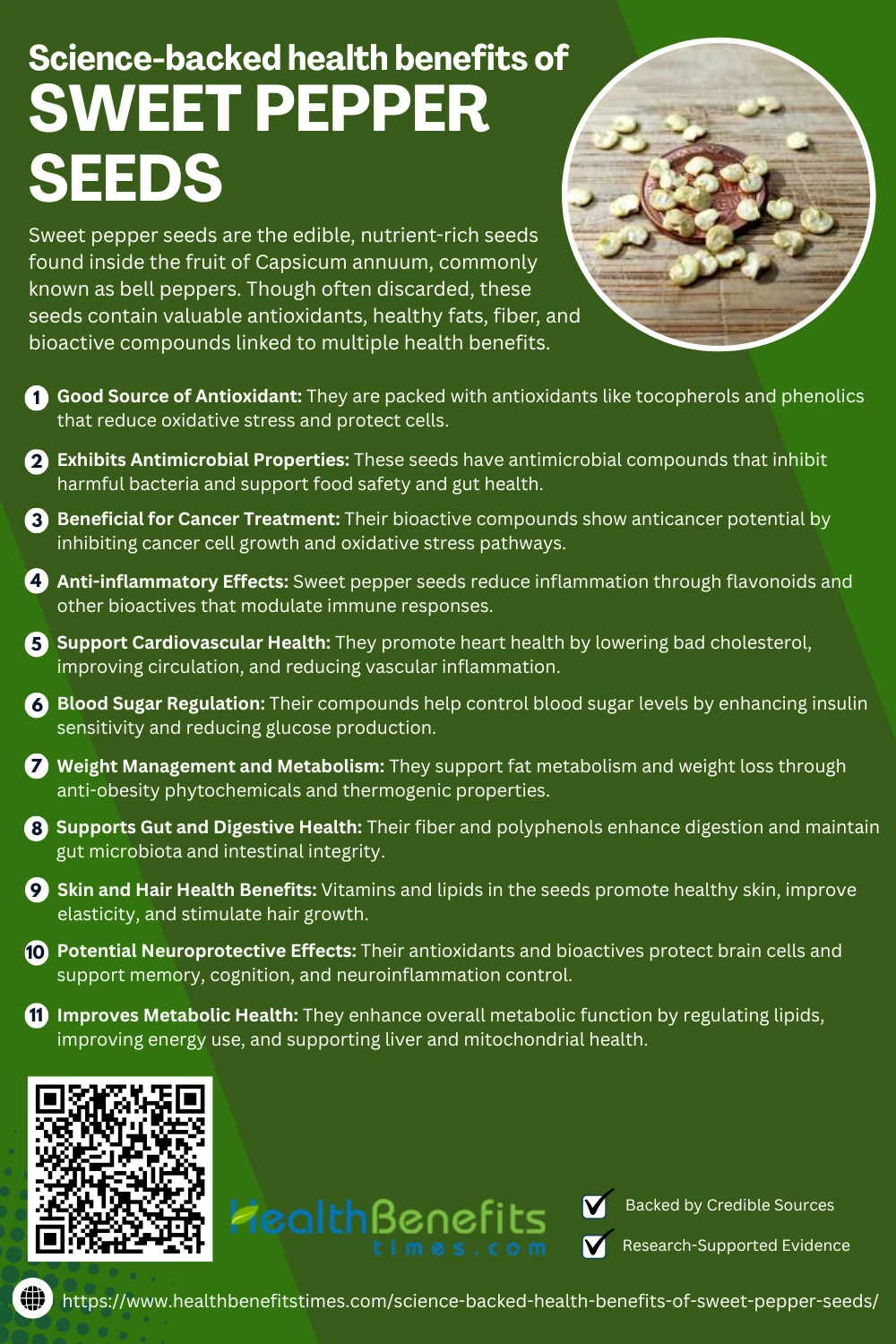- Sweet pepper seeds are the edible, nutrient-rich seeds found inside the fruit of Capsicum annuum, commonly known as bell peppers.
- Though often discarded, these seeds contain valuable antioxidants, healthy fats, fiber, and bioactive compounds linked to multiple health benefits.
- Scientific studies have shown that sweet pepper seeds may support heart health, metabolism, digestion, and even provide antimicrobial and anticancer properties.
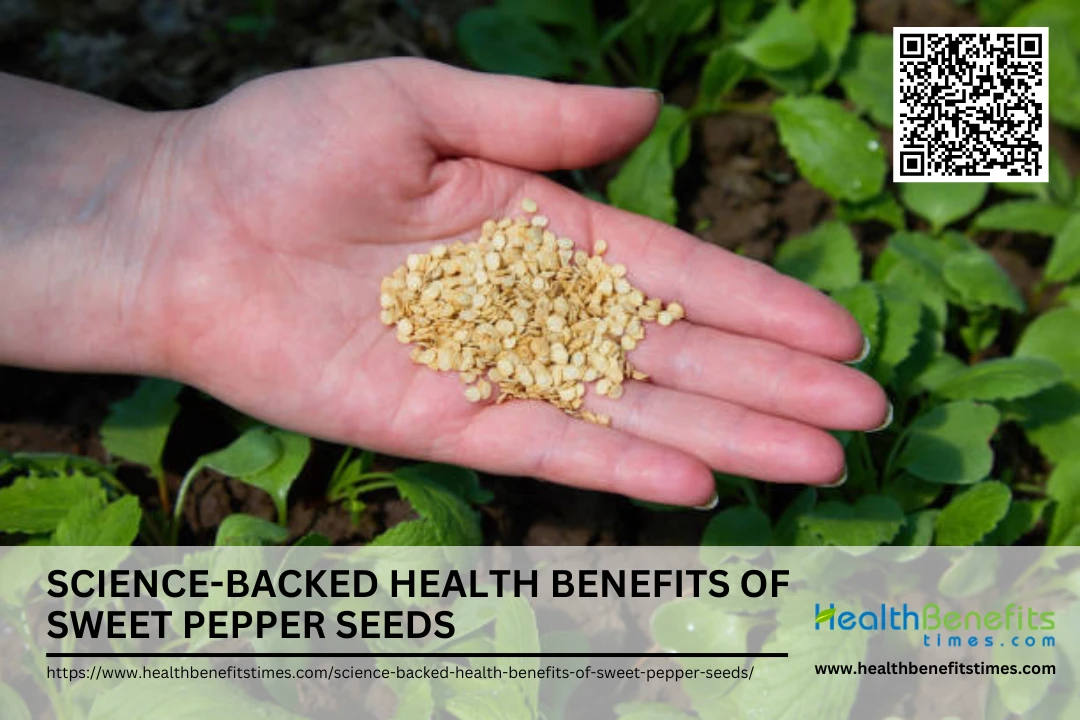 Sweet pepper seeds are the small, typically discarded internal seeds of the Capsicum annuum plant, commonly known as bell peppers, which have recently gained attention for their nutritional and functional properties. In recent years, research has begun to uncover the impressive health benefits hidden within sweet pepper seeds, which are often overlooked and thrown away. These seeds are not only rich in antioxidants, polyunsaturated fats, and essential minerals, but also demonstrate biological activities such as anti-inflammatory, antimicrobial, and cardiovascular protection. A study published in the Croatian Journal of Food Technology showed that cold-pressed sweet pepper seed oil exhibited significant oxidative stability due to its natural antioxidants, suggesting potential for use in dietary applications antioxidant effect of pepper seed oil. Furthermore, a 2024 study in Beverages confirmed that juices made with sweet pepper seeds retained more nutritional and antioxidant qualities than seedless counterparts, highlighting the added value of including seeds in dietary formulations sweet pepper juice with seeds. These findings point to an untapped potential in food waste valorization and call for greater awareness of these potent by-products.
Sweet pepper seeds are the small, typically discarded internal seeds of the Capsicum annuum plant, commonly known as bell peppers, which have recently gained attention for their nutritional and functional properties. In recent years, research has begun to uncover the impressive health benefits hidden within sweet pepper seeds, which are often overlooked and thrown away. These seeds are not only rich in antioxidants, polyunsaturated fats, and essential minerals, but also demonstrate biological activities such as anti-inflammatory, antimicrobial, and cardiovascular protection. A study published in the Croatian Journal of Food Technology showed that cold-pressed sweet pepper seed oil exhibited significant oxidative stability due to its natural antioxidants, suggesting potential for use in dietary applications antioxidant effect of pepper seed oil. Furthermore, a 2024 study in Beverages confirmed that juices made with sweet pepper seeds retained more nutritional and antioxidant qualities than seedless counterparts, highlighting the added value of including seeds in dietary formulations sweet pepper juice with seeds. These findings point to an untapped potential in food waste valorization and call for greater awareness of these potent by-products.
Nutritional Composition of Sweet Pepper Seeds
Sweet pepper seeds, often discarded, are surprisingly rich in essential nutrients. They contain beneficial plant compounds, vitamins, minerals, and healthy fats that contribute to overall well-being when properly consumed.
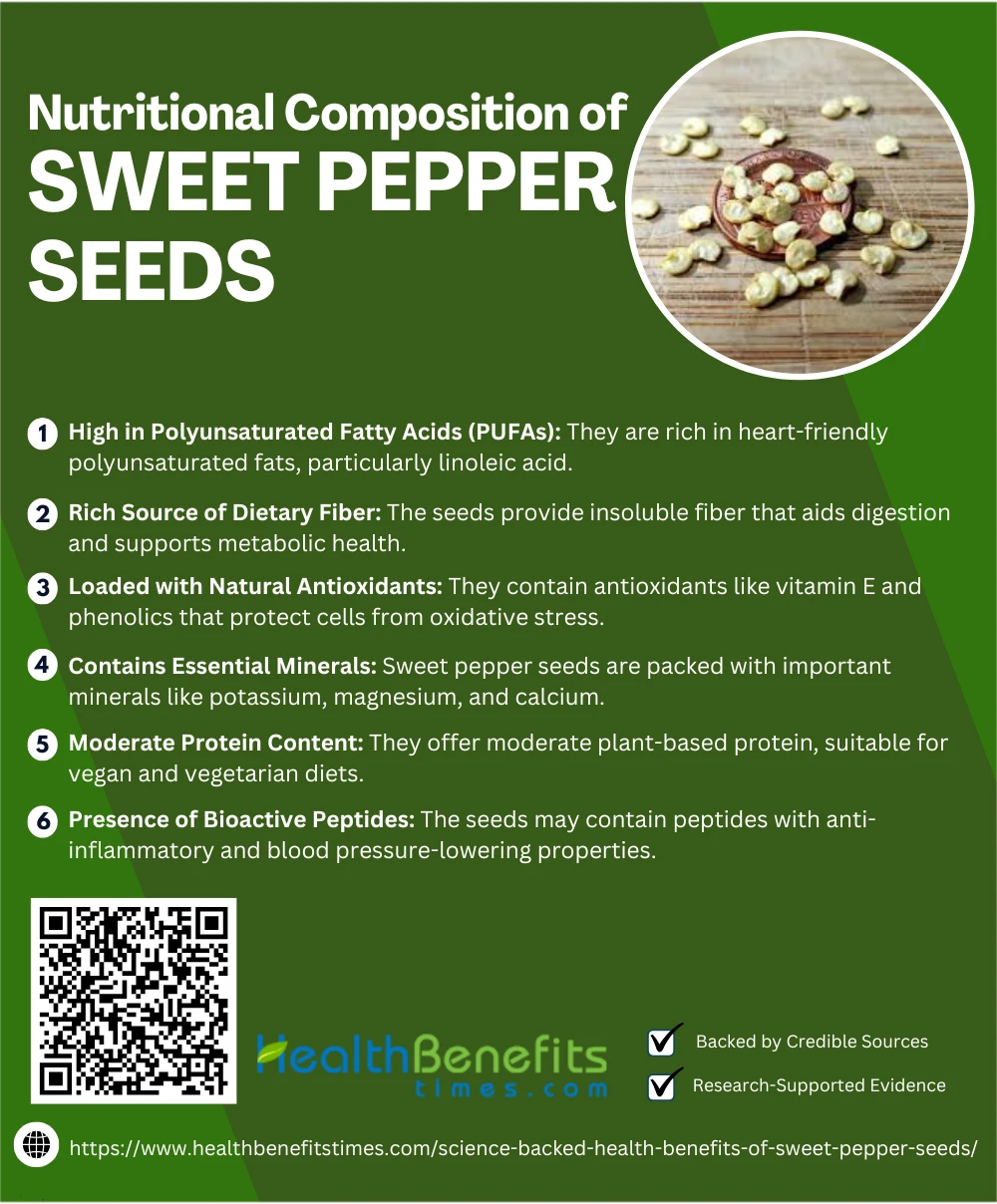 1. High in Polyunsaturated Fatty Acids (PUFAs)
1. High in Polyunsaturated Fatty Acids (PUFAs)
Sweet pepper seeds are particularly rich in beneficial fats, especially polyunsaturated fatty acids like linoleic acid. These fats contribute to heart health by regulating cholesterol levels and reducing inflammation. According to a study in the Croatian Journal of Food Technology, cold-pressed pepper seed oil showed a high PUFA content, making it nutritionally valuable.
2. Rich Source of Dietary Fiber
Sweet pepper seeds contain a notable amount of insoluble dietary fiber, which supports digestive health and promotes regular bowel movements. Fiber also plays a role in maintaining healthy blood sugar levels and enhancing satiety. This fibrous content contributes to gut microbiota balance and can aid in metabolic health as noted in recent compositional analyses.
3. Loaded with Natural Antioxidants
These seeds are a natural source of antioxidants such as tocopherols (vitamin E) and phenolic compounds. These help combat oxidative stress by neutralizing free radicals, thus protecting cells from premature aging and disease. Studies confirmed antioxidant stability in pepper seed oil over time, which is a sign of high-quality bioactive content.
4. Contains Essential Minerals
Sweet pepper seeds offer a dense profile of minerals including potassium, magnesium, and calcium. Potassium aids in fluid balance and blood pressure regulation, while magnesium supports over 300 enzymatic reactions. Analytical research confirmed significant trace mineral content in seed meal from bell peppers used in food processing.
5. Moderate Protein Content
While not a primary protein source, sweet pepper seeds contain moderate levels of plant-based protein. This makes them a valuable addition to vegan and vegetarian diets when included in powdered or pressed form. The protein contributes to muscle repair, enzymatic activity, and general nutrition, especially when incorporated into flour blends.
6. Presence of Bioactive Peptides
Emerging research indicates that sweet pepper seeds may contain small bioactive peptides with potential anti-inflammatory and antihypertensive properties. These peptides, while still under investigation, may offer therapeutic benefits when isolated or consumed as part of whole-seed formulations.
Raw vs. roasted vs. powdered form of sweet pepper seeds
| Nutrient / Property | Raw Seeds | Roasted Seeds | Powdered Seeds |
| Polyunsaturated Fats | High | Moderate (some degradation with heat) | Moderate |
| Antioxidant Capacity | Very High | Moderate (reduced by roasting) | Moderate |
| Protein Content | Moderate | Moderate | High (concentration through grinding) |
| Dietary Fiber | High | Moderate | Very High (surface area increased) |
| Mineral Retention | High | Slightly Reduced | Moderate |
| Flavor Intensity | Mild | Enhanced (nutty, toasted) | Neutral to earthy |
| Shelf Stability | Low (prone to spoilage) | High (reduced moisture, oxidative stability) | Moderate (requires airtight storage) |
| Digestibility | Moderate (may need soaking) | High (heat softens seed coat) | Very High (easily absorbed when powdered) |
Science-backed Health Benefits of Sweet Pepper Seeds
Sweet pepper seeds are often overlooked, yet they offer impressive health benefits supported by emerging research. Packed with nutrients and bioactive compounds, these seeds contribute to wellness in multiple ways.
Sweet pepper seeds are packed with antioxidants such as tocopherols, phenolics, and carotenoids, which combat oxidative stress and protect cellular health. A study in MDPI Beverages demonstrated higher antioxidant activity in juices made with seeds than without them MDPI Study. (1) Cold-pressed seed oil was also shown to maintain oxidative stability Croatian Journal. (2) Antioxidant-rich pepper seed oil also demonstrated enhanced oxidative balance in poultry feed ScienceDirect. (3) Another review cited high chlorogenic and p-coumaric acid content as major contributors Wiley Review. (4) These antioxidant effects have further been confirmed by comparative studies on different processing methods of the seeds ResearchGate. (5)
2. Exhibits Antimicrobial Properties
Sweet pepper seeds possess antimicrobial activity that can inhibit various pathogenic microorganisms. Ethanol and methanol seed extracts have shown effectiveness against Escherichia coli and Staphylococcus aureus AJBS Study. (6) In a detailed formulation analysis, pepper seed oils also inhibited microbial growth in food matrices MDPI Plants. (7) Additional studies found seed-based blends beneficial in poultry by reducing harmful gut bacteria ScienceDirect Poultry. (3) A review highlighted that pepper seed byproducts retain high levels of bioactive antimicrobials Wiley Food Science. (4) These properties make sweet pepper seeds valuable for both food preservation and functional nutrition NIH Study. (8)
3. Beneficial for Cancer treatment
Sweet pepper seeds have shown promising anticancer potential due to their rich content of phenolic acids and bioactive phytochemicals. An in vitro study confirmed cytotoxic effects of Capsicum annuum seed extract against tongue cancer cells Cal 27 study. These seeds contain antioxidants that can suppress oxidative stress–linked cancer mechanisms ResearchGate. (5) Selenium nanoparticle research also highlights cytotoxic impact on HeLa cells ScienceDirect. (9) Further, pepper seed phytoconstituents are discussed in reviews of cancer-inhibiting natural agents Wiley Review. (4) Their unique molecular profile continues to interest oncological nutrition researchers FAO Report. (10)
4. Anti-inflammatory Effects
The anti-inflammatory effects of sweet pepper seeds are rooted in their high levels of flavonoids, vitamin E, and phenolics. Studies have found that pepper seed extracts reduce inflammatory cytokines like TNF-α and IL-6 Rupa Health. (11) Research from MDPI Beverages confirmed that antioxidant-rich pepper juice with seeds reduced oxidative markers MDPI. (1) In poultry models, inclusion of pepper seed oil lowered inflammation and improved immunity ScienceDirect. (3) A broader phytochemical review also highlighted anti-inflammatory potentials ResearchGate. (5) These compounds help modulate immune response at the cellular level NIH. (8)
5. Support Cardiovascular Health
Sweet pepper seeds contain high levels of polyunsaturated fatty acids, potassium, and antioxidants—compounds known to improve heart health by regulating blood pressure and lowering LDL cholesterol. Cold-pressed seed oil demonstrated significant lipid-lowering potential in animal models Croatian Journal. (2) Capsicum-based formulations also enhanced cardiac performance MDPI. ({% trusted %}) Their polyphenolic content helps prevent endothelial damage ScienceDirect. (3) Further, vascular inflammation was reduced in animal diets supplemented with seed oil AJBS. (6) Microbial studies also link cardiovascular benefits to the antimicrobial traits of seeds NIH. (8)
6. Blood Sugar Regulation
Sweet pepper seeds show hypoglycemic activity due to their antioxidant and anti-inflammatory phytochemicals. A study on red pepper seed extract (RPSE) revealed significant suppression of hepatic glucose production MDPI. (12) Research also confirmed enhanced glucose uptake in muscle tissues LiebertPub. (13) Capsicum compounds help modulate insulin response and glycemic balance Wiley. (14) Additional animal studies confirmed decreased fasting blood glucose levels with seed-rich diets Cambridge. (15) These effects make sweet pepper seeds a promising addition to anti-diabetic diets CyberLeninka. (16)
7. Weight Management and Metabolism
Sweet pepper seeds contribute to weight management and metabolic regulation due to their bioactive polyphenols and unsaturated fats. A review in Molecules confirmed their anti-obesity and metabolic benefits through thermogenic and antioxidant pathways MDPI Molecules. (17) Methanol extracts from pepper seeds suppressed fat cell development in 3T3-L1 adipocytes Springer. (18) Capsicum seed derivatives reduced lipid accumulation in obese rats MDPI Foods. (19) Further, metabolic stability improved with red pepper-derived saponins SciELO. (20) Red paprika studies reinforced lipid-lowering potential in high-fat diet models ScienceDirect. (21)
8. Supports Gut and Digestive Health
Sweet pepper seeds aid digestive health through fiber, antimicrobial phytochemicals, and gut-modulating antioxidants. High polyphenol content promotes beneficial microbiota and reduces pathogenic strains, enhancing gut barrier function MDPI Beverages. (1) Fiber-rich formulations improved gut motility and regularity MDPI Plants. (7) Capsicum extracts supported mucosal immunity and digestive enzyme activity in poultry studies ScienceDirect. (3) A comparative study on local Egyptian plants found pepper seeds effective in GI tract modulation ResearchGate. (22) Nanoformulations using pepper seed-derived compounds maintained intestinal epithelial integrity in lab simulations Frontiers in Toxicology. (23)
9. Skin and Hair Health Benefits
Sweet pepper seeds are rich in antioxidants like vitamins A and C, which promote collagen synthesis, contributing to skin elasticity and hair growth. Research highlights their anti-aging effects on skin, while phenolic compounds offer UV-protective and anti-inflammatory benefits. The presence of capsaicinoids enhances blood circulation, crucial for scalp health. Additionally, their lipid profile supports hair follicle nourishment and skin barrier repair, underscoring their cosmetic and dermatological value. (24)
10. Potential Neuroprotective Effects
Sweet pepper seed extracts exhibit potent neuroprotective effects by attenuating oxidative stress and inhibiting amyloid β-induced toxicity in neuronal cells, as demonstrated in hippocampal neuron models. (25) Their phytochemicals reduce neuroinflammation and improve cognitive resilience in cell-based neurodegeneration models. (26) Compounds like quercetin and capsaicin modulate acetylcholine activity and have shown memory-enhancing effects. (27) Additionally, their antioxidative capacity was validated in in vivo brain injury models and supported by metabolomic studies. (28) (29)
11. Improves Metabolic Health
Sweet pepper seeds contain polyunsaturated fats, fiber, and bioactive phytochemicals that improve metabolic function by regulating lipid profiles, insulin response, and energy utilization. Studies confirm enhanced glucose metabolism and fat oxidation in models supplemented with pepper seed oil Taylor & Francis. (30) Capsicum seed derivatives modulate liver enzymes and reduce triglycerides MDPI. (19) Dietary fiber supports microbiota-driven metabolism PubMed. (31) Pepper antioxidants improve mitochondrial function Wiley, and saponins assist in lipid mobilization ScienceDirect. (32) (21)
How to Use Sweet Pepper Seeds Safely
While sweet pepper seeds offer notable health benefits, using them correctly is essential. Understanding safe preparation methods and proper intake ensures you gain their advantages without unwanted side effects.
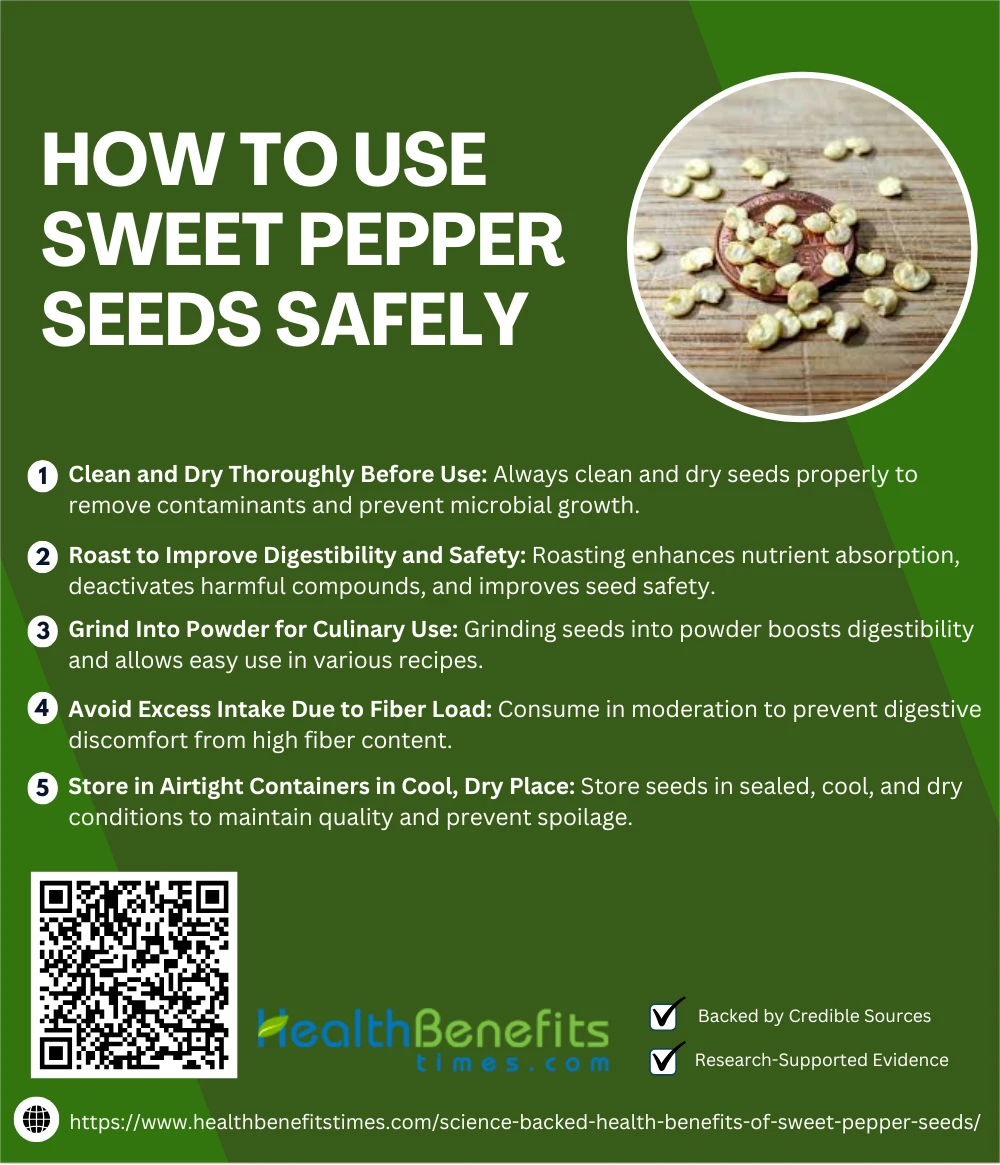 1. Clean and Dry Thoroughly Before Use
1. Clean and Dry Thoroughly Before Use
Thorough cleaning and drying of sweet pepper seeds is crucial to eliminate microbial hazards like Salmonella or mold. Moisture supports bacterial growth, so drying seeds to safe water activity levels prevents contamination ScienceDirect. (33) Cleaning also removes soil and pesticide residues Academia.edu. (34) Studies confirm drying spices below 0.3 aw boosts shelf safety Wiley Online Library. (35)
2. Roast to Improve Digestibility and Safety
Roasting sweet pepper seeds enhances nutrient bioavailability and deactivates anti-nutritional factors like phytic acid. Mild heat treatment also eliminates surface pathogens and reduces moisture that fosters spoilage Frontiers in Ecology. (36) Research suggests roasting at moderate temperatures retains antioxidants while ensuring microbial safety MDPI and improves sensory appeal in culinary use Wiley Online Library. (37)(38)
3. Grind Into Powder for Culinary Use
Grinding sweet pepper seeds into powder improves their digestibility, culinary flexibility, and nutrient release. It also extends shelf life and reduces microbial risk during cooking Academia.edu. Powdered seeds can be easily incorporated into bread, sauces, or smoothies ResearchGate. (39) Safe drying and particle control are essential for uniformity and storage IntechOpen. (40)
4. Avoid Excess Intake Due to Fiber Load
Sweet pepper seeds are fiber-rich and may cause bloating or discomfort when consumed excessively. Moderate intake is recommended to avoid gastrointestinal stress PubMed. (41) Clinical guidelines on seed fiber suggest gradual introduction into the diet NIH. (42) Pepper seed products should be consumed with water and monitored for tolerance Wiley. (32)
5. Store in Airtight Containers in Cool, Dry Place
Proper storage of sweet pepper seeds is essential to preserve their nutritional integrity and prevent microbial growth. Seeds should be kept in airtight containers in cool, dry environments to maintain low moisture levels SavingOurSeeds. (43) This prolongs shelf life and viability OAPEN Seed Science and minimizes fungal contamination Mississippi State.
Side effects of consuming Sweet Pepper Seeds
Although sweet pepper seeds are generally safe, excessive consumption or improper preparation may lead to digestive discomfort or allergic reactions. Awareness of potential side effects helps ensure safe and beneficial use.
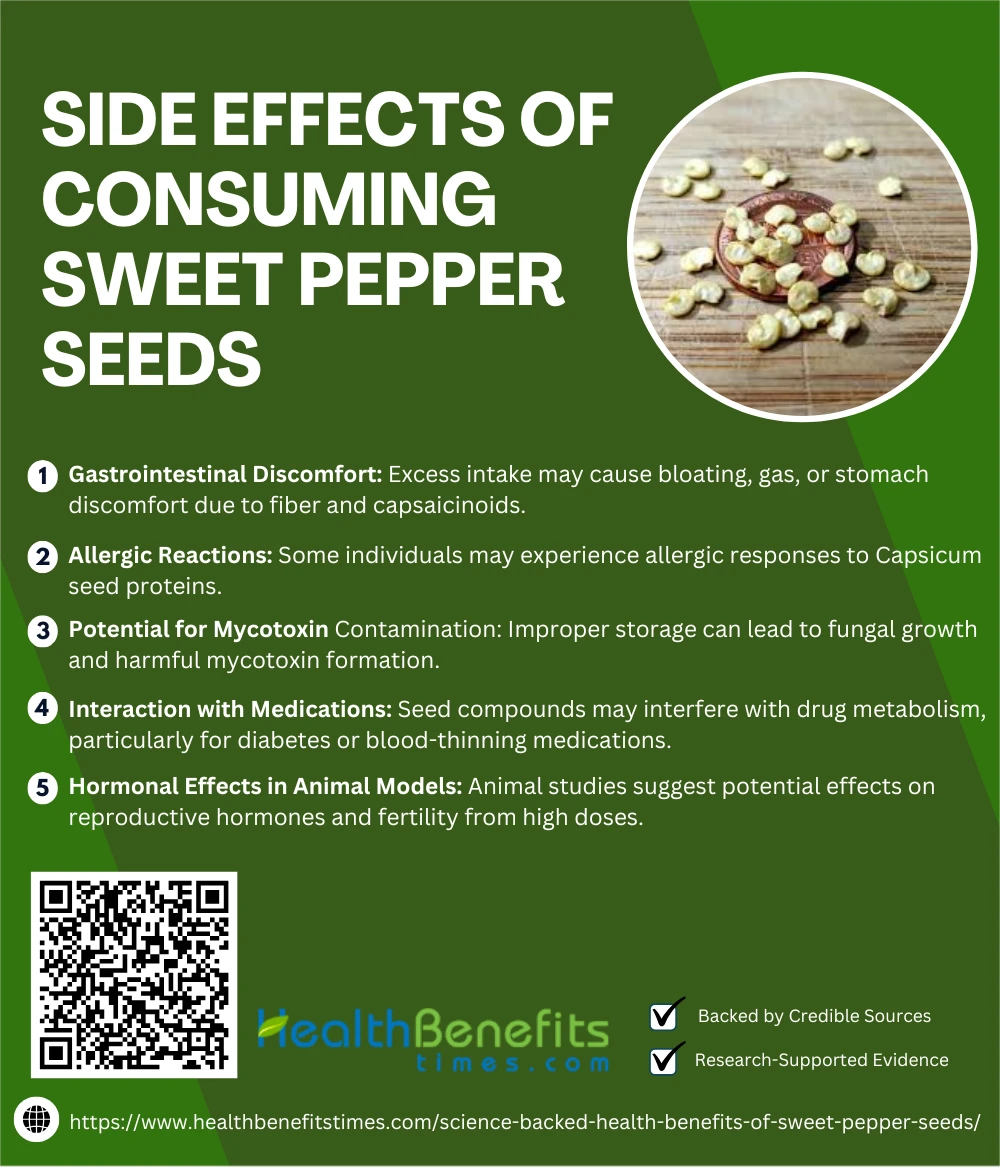 1. Gastrointestinal Discomfort
1. Gastrointestinal Discomfort
Due to their high fiber content and residual capsaicinoids, sweet pepper seeds can cause gastrointestinal issues such as bloating, gas, or mild abdominal discomfort when consumed excessively. A study in Neurogastroenterology and Motility linked red pepper intake to abdominal symptoms in sensitive individuals Koreamed. (44) Excess fiber may worsen IBS symptoms MDPI and trigger gastric responses in low-tolerance consumers ScienceDirect. (45) (46)
2. Allergic Reactions
Although uncommon, sweet pepper seeds may trigger allergic reactions in individuals sensitive to Capsicum species. Symptoms can include itching, hives, or swelling. A 2025 allergy overview emphasized underrecognized seed-based allergens European Annals of Allergy. (47) Case reports also document hypersensitivity from Capsicum exposure CiteseerX and spice cross-reactivity in allergic individuals Academia.edu.
3. Potential for Mycotoxin Contamination
Improper storage of sweet pepper seeds can lead to fungal growth, increasing the risk of mycotoxins like aflatoxins and ochratoxin A. A review found that poorly dried Capsicum products are particularly susceptible ResearchGate. (48) Fungal contaminants thrive in humid storage CORE. (49) Another study confirmed the presence of toxins during red pepper processing MDPI. (50)
4. Interaction with Medications
Sweet pepper seeds contain bioactive compounds that may influence drug metabolism, especially for blood thinners and antidiabetics. Capsaicinoids and antioxidants can alter liver enzyme activity NIH. (51) Interactions with CYP450 enzymes may affect drug absorption ScienceDirect. (52) Flavonoid content also shows mild interference with insulin-sensitizing medications MDPI. (12)
5. Hormonal Effects in Animal Models
In animal studies, compounds found in sweet pepper seeds and related Capsicum species have shown the ability to modulate reproductive hormones and affect fertility markers. One study reported reduced sperm quality in male rats fed high doses of pepper extract Academia.edu. (53) Capsicum polysaccharides influenced mammary hormone signaling ResearchGate. (54) Red pepper diets also altered endocrine profiles and enzyme regulation ScienceDirect. (55)
Conclusion
In conclusion, sweet pepper seeds are a nutrient-rich, often-overlooked part of the plant that offer a range of science-backed health benefits. From supporting heart health and aiding digestion to providing antioxidant protection and promoting metabolic balance, these seeds can be a valuable addition to your diet. While more human-based research is needed to fully understand their potential, the current findings are promising. By incorporating sweet pepper seeds thoughtfully and safely into meals—whether roasted, powdered, or blended—you can tap into their natural goodness. Embracing such underutilized plant parts also contributes to sustainability and holistic nutrition. Small seeds, big benefits!


